Chisholm, Caroline (1808-1877), devoted a great part of her life to the welfare of immigrants to Australia. She also encouraged migrants to leave the crowded towns and settle the farming lands of Australia. Many people believe that she was Australia’s greatest woman pioneer.

Early life.
Caroline Chisholm was born in Wootton, Northampton, England, on May 30, 1808. Her maiden name was Caroline Jones. In 1830, she married Archibald Chisholm, a captain in the British East India Company. He was assigned to India in 1832, and Caroline founded a school in Madras (now Chennai). In 1838, they moved to the British colony of New South Wales in Australia and settled in Sydney.
Helping immigrants.
From 1820, the British government began encouraging migration to Australia as a means of reducing widespread unemployment in the United Kingdom. From 1831, it gave assistance to approved migrants who would settle the land.
Caroline Chisholm became deeply concerned about the difficulties that faced immigrants, especially young women and families. Using much of her own money, and with some official help from the colonial governor, Sir George Gipps, she opened a Female Immigrants Home in Sydney in 1841. In the home, she gave shelter to arriving women migrants.
She worked to find suitable employment for the migrants. She corresponded with settlers throughout New South Wales, finding out what jobs were available, and arranging wages, rations, and conditions of employment. She formed parties of people and personally found employment for them with settlers of good character.
In 1846, she returned to the United Kingdom, where she spoke to the families of people who had already emigrated, and to others seeking advice about emigrating. She was concerned about children who had been separated from parents who had migrated or been transported to Australia. She worked untiringly to help restore these children to their parents.
Settling the land.
Caroline Chisholm believed that young migrants would be best for Australia. She also believed that they should settle on their own small farms. In 1849, she founded the Family Colonization Loan Society—a society through which deserving families could pay for their passage in installments after they had arrived in Australia. This money then helped to pay for the passage of other families. Archibald Chisholm, as secretary of the society, traveled to Australia in 1852 to supervise the arrival of the settlers.
During the early 1850’s, after gold was discovered, no one needed to encourage people to migrate to Australia. Thousands of people from all parts of the world flocked to the Australian gold fields. Archibald Chisholm worked in Adelaide and Melbourne, helping with the increased number of migrants. He arranged shelter for them on arrival, inspected and reported on ships, and gave advice on travel and equipment. In 1854, Caroline traveled to Australia to join her husband. She toured the Victorian gold fields and set up shelters for miners and their families. The shelters became known as Chisholm’s Shakedowns.
Later life.
In 1857, Caroline Chisholm began a series of letters in the Melbourne newspaper Argus for the information of British workers. But, in the same year, she became ill. She and her family lived in Kyneton, near Melbourne, for a brief period, then moved to Sydney in 1859. In Sydney, she continued to work for the rights and comforts of the underprivileged. She gave lectures on settling the land, early closing for shops, better housing conditions, and shorter working hours. But her health declined, and she gave up political activities. In 1862, she opened a boarding school for young ladies in Newtown, Sydney. In 1866, she returned to the United Kingdom with her family. She died in London on March 25, 1877.
